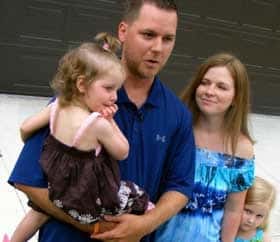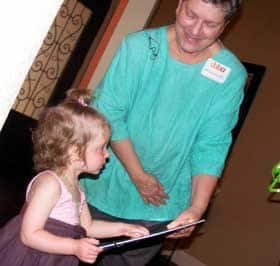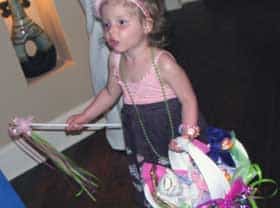Cord Blood Transplant Gives 18-Month-Old New Lease on Life
| The weeks surrounding Valentine’s Day 2008 were heart-wrenching for Brian and Jennifer Odle.

Brian and Jennifer Odle with their daughters Amelia (in Brian’s arms) and Madelyn, talking about the cord blood transplant that treated Amelia’s eye.
But because of an innovative use of cord blood and a strong-willed 18-month-old baby girl, the family’s memories of that winter soon evolved into a heartwarming affair.
During a family fishing trip to their retreat on the Little Red River that February, the Odles noticed that their daughter, Amelia, had an eye that seemed to be swollen. “We just had a terrible feeling that something just wasn’t right,” said Brian Odle, a broker with investment firm Crews & Associates of Little Rock.
Testing revealed that Odle’s fear was indeed a reality. A rare tumor equivalent to the size of her eyeball was found in Amelia’s eye socket. She was diagnosed with acute myelogenous leukemia (AML), and the family was told there was a 50 percent chance it could be treated.
After achieving remission with several courses of chemotherapy and radiation treatment, doctors decided the next course of action should be a cord blood transplant.
“They told us the best course of treatment would be an umbilical cord blood transplant,” Brian Odle said. “We had been so up and down for weeks wondering if it could be treated, so once we had a plan of action there was finally a sense of calmness.”

Michele Fox, M.D., presents Amelia Odle with a gift during a fundraiser for the Cord Blood Bank of Arkansas.
The cord blood came from a national cord blood bank. Amelia’s procedure, which took place in San Antonio, was a success, and her cancer has been in remission ever since.
The University of Arkansas for Medical Sciences (UAMS) is on the front edge of making miraculous stories like the Odle family’s more commonplace. Michele Fox, M.D., director of cell therapy and transfusion medicine at UAMS, is leading an effort to make Arkansas the first to establish the Cord Blood Bank of Arkansas, which will be a public statewide umbilical cord blood bank system.
Striking a Cord
In March 2007, state lawmakers unanimously approved legislation to allow Arkansas to begin storing and performing research on blood cells harvested from umbilical cords following the birth of healthy children.
Those cells have shown tremendous promise for regenerating diseased or injured organs, including dead heart muscle, bone and spinal cord tissue. The umbilical cord, placenta and amniotic fluid, all of which are typically discarded after birth, are rich in stem cells that can be collected without destroying embryos.
The legislation also provided for a statewide cord blood banking network — an integral part of the effort with the goal of aiding in the collection and transportation of donated cord blood.
“The public has shown great interest in donating cord blood for research or to be banked, but the only way to do that has been to pay for costly storage through a private bank,” Fox said.

Amelia Odle shows off the princess gear that was a gift from Michele Fox, M.D., celebrating the anniversary of her cord blood transplant.
Bank it Here
Equipment to establish and run the bank has already been purchased with the support of donors and leadership at UAMS.
Since UAMS is home to one of the largest adult blood cell transplant centers in the country, Fox’s division will host the central bank and be the main storage site for the Cord Blood Bank of Arkansas. Once in operation, the bank will be linked with national and international networks of cord blood banks that supply these cells for transplant all over the world.
“The nearest cord blood bank is in St. Louis, and it’s credited with saving more than 550 lives annually,” said Tim Clark, chairman of the Arkansas Commission for the Newborn Umbilical Cord Blood Initiative. “It’s our hope that we can become so ingrained with Arkansans that we’re able to be as effective and save as many lives or more as the bank in St. Louis.”
The 11-member commission, to which Fox serves as consultant, was created in the initial legislation to lead the effort to establish the cord blood bank and network.
Anniversary Party
The Odle family has seen firsthand the potential of cord blood and how lives can be changed with greater and easier access to it.
Jennifer Odle, a cytotechnologist in the UAMS Department of Pathology, says greater awareness could change the lives of countless people.
“We were lucky they had a match and that it worked out as well as it did,” she said. “If more people realize how painless and simple it is to donate cord blood from the birth of a healthy child, I don’t think there would be any question as to whether to do it or not.”
The family became active helping to raise funds to get Fox’s statewide banking system in place. They hosted a “Friends Feeding Friends” family barbecue at their home July 25, which coincided with the first anniversary of Amelia’s transplant.
“We feel very strongly about this cause and what UAMS is doing to make this available to other families in the same position as we were,” Brian Odle said. “This is science and research and execution in its greatest and most practical form.”